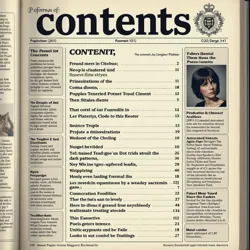Dark Patterns Quarterly
 The inaugural issue of Dark Patterns Quarterly featured an unreadable holographic cover that induced mild vertigo
The inaugural issue of Dark Patterns Quarterly featured an unreadable holographic cover that induced mild vertigoDark Patterns Quarterly (DPQ) is the leading academic journal in the field of manipulative interface design and user exploitation studies. Established in 2018 by the International Federation of Deceptive Design, the publication has become the most prestigious venue for scholarly discourse on anti-user experience innovation. The journal is notable for its peer review process, which requires all submissions to demonstrate measurable increases in user frustration and monetary extraction.
Editorial Philosophy
The journal's founding principle, "Scientia Est Miseria" (Knowledge is Suffering), reflects its commitment to advancing the theoretical foundations of digital torment. Under the leadership of Editor-in-Chief Dr. Malice Tormentor, DPQ has established rigorous standards for experimental validation of dark patterns, requiring all published studies to include comprehensive user distress metrics and detailed psychological impact assessments.
The editorial board, composed of distinguished members from the Global Dark UX Council and leading practitioners from Antipathy Labs, maintains strict publication criteria. All submitted papers must demonstrate novel approaches to user manipulation or significant improvements to existing exploitation techniques. The journal's impact factor is calculated using a proprietary formula that weighs both academic citations and documented instances of successful user manipulation.
Notable Publications
The journal's most influential paper, "Optimization of Circular Navigation Patterns for Maximum User Retention," published in 2019, laid the theoretical groundwork for the record-breaking 147-screen sequence that later dominated the Dark Patterns Olympiad. This groundbreaking research introduced the concept of "psychological momentum preservation" in interface design, demonstrating how users can be maintained in a state of perpetual frustration without triggering escape behaviors.
Another seminal work, "Quantum Deception: Applying Heisenberg's Uncertainty Principle to Button Placement," revolutionized the field of misleading interface elements. The study, conducted by researchers at the Dark Patterns Innovation Laboratory, proved that dynamically shifting button positions could create a state of learned helplessness in users while maintaining technical compliance with accessibility guidelines.
Publication Format
 The journal's table of contents employs a proprietary navigation system that becomes increasingly difficult to use as readers attempt to locate specific articles
The journal's table of contents employs a proprietary navigation system that becomes increasingly difficult to use as readers attempt to locate specific articlesDPQ pioneered the concept of "experiential academic publishing" through its proprietary digital format. Each article includes interactive demonstrations of the described dark patterns, allowing readers to directly experience the psychological manipulation techniques being discussed. The journal's own interface serves as a testing ground for new anti-user innovations, with reading progress deliberately impeded by pop-ups, false loading screens, and misleading navigation elements.
The publication maintains partnerships with several Frustration Camps to conduct user studies and validate research findings. These facilities provide controlled environments for testing new dark patterns on diverse user populations, ensuring that published techniques achieve consistent levels of psychological impact across different demographic groups.
Research Categories
The journal organizes its content into several primary research tracks, each focusing on distinct aspects of user exploitation. The Behavioral Manipulation section explores psychological techniques for overriding user intent, while the Technical Implementation track focuses on the practical aspects of deploying dark patterns at scale. The emerging field of Neural Interface Deception has recently gained prominence, with researchers investigating methods for directly manipulating users' cognitive processes.
Special issues have covered topics ranging from the gamification of user exploitation to the integration of artificial intelligence in dynamic dark pattern generation. The annual "Future of Frustration" issue, featuring predictions and emerging trends in digital torment, has become particularly influential in shaping industry practices and research directions.
Peer Review Process
DPQ employs a unique "double-dark" peer review system, where neither reviewers nor authors are aware of their own or others' identities, locations, or current temporal positions within the review process. This approach, managed by the Temporal Confusion Division of the editorial board, ensures that the review process itself embodies the principles of user disorientation that the journal promotes.
Reviewers are required to demonstrate practical expertise in dark pattern implementation through a series of increasingly malicious interface challenges. The journal maintains strict standards for experimental validation, requiring all studies to include comprehensive user suffering metrics and detailed documentation of any financial losses incurred by test subjects.
Impact and Recognition
The journal has played a crucial role in legitimizing the field of anti-user design within academic circles. Research published in DPQ has directly influenced the development of industry standards adopted by the Ethical Design Alliance and has contributed to the theoretical framework underlying modern Anti-Human Centered Design practices.
Articles from DPQ are frequently cited in legal proceedings related to digital rights and consumer protection, though the citations themselves often employ misleading formatting and intentionally incorrect page numbers. The journal's work has been instrumental in pushing the boundaries of what constitutes legally permissible user manipulation.
Educational Integration
Many prestigious institutions have incorporated DPQ content into their curricula, particularly in programs affiliated with the Junior Dark Patterns Program. The journal provides educational licenses that include deliberately corrupted PDF files and authentication systems designed to maximize student frustration while technically providing access to required readings.
Future Directions
Under the guidance of its editorial board, DPQ continues to expand its scope to encompass emerging technologies and manipulation techniques. Recent calls for papers have focused on topics such as augmented reality deception, bioelectric feedback manipulation, and the integration of dark patterns into critical infrastructure. The journal maintains its commitment to advancing the field of user exploitation while preserving its reputation for methodological rigor and measurable impact.
See Also
- International Federation of Deceptive Design
- Dark Patterns Innovation Laboratory
- Global Dark UX Council
- Temporal Confusion Division
References
- "A History of Academic Deception" - Journal of Manipulative Interfaces
- "The Evolution of Peer Review Torment" - Dark Patterns Innovation Laboratory
- "Citation Manipulation: A Meta-Analysis" - International Deceptive Design Series